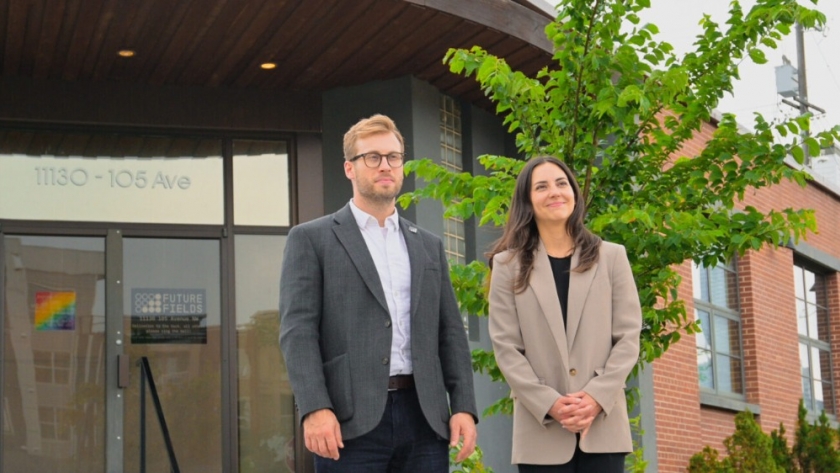
Por Agroempresario.com
Canadian startup Future Fields is transforming the biomanufacturing industry by producing complex proteins using genetically engineered fruit flies, offering a low-cost, sustainable alternative to traditional platforms.
Founded in 2018 by Matt and Jalene Anderson-Baron, Future Fields has secured an $8 million Series A funding round to scale its innovative bioproduction platform. The funding—co-led by Amplify Capital, BDC’s Climate Tech Fund, and R7 Partners, with additional backing from Toyota Ventures, BoxOne Ventures, Builders VC, TRAC VC, and the University of Alberta Innovation Fund—will fuel expansion of the startup’s insect-based system, which enables high-yield, sustainable recombinant protein production.
Originally focused on growth factors for cultivated meat, Future Fields has since broadened its mission. Today, it targets a broader range of industries, including biopharma, food, and agriculture. At the heart of its innovation lies an unexpected but effective biofactory: the humble fruit fly (Drosophila).
Traditional biomanufacturing methods—using microbial or mammalian cells in steel bioreactors—are resource-intensive and expensive. They often fall short when it comes to producing complex proteins that require sophisticated folding or post-translational modifications. Future Fields’ fruit fly platform offers a compelling alternative.
“Clients come to us because they’ve struggled to make proteins in legacy platforms,” explains Matt Anderson-Baron, CEO and cofounder. “In many cases, yields are too low or the protein is simply too complex to produce using microbial systems. Fruit flies possess advanced internal machinery that helps overcome these limitations.”
In contrast to bioreactors that require significant water, energy, and infrastructure investment, fruit flies thrive on minimal inputs and can operate in modest facilities. In December 2024, Future Fields opened a commercial-scale plant capable of producing kilogram quantities of high-purity proteins per year—demonstrating the platform’s scalability.
In biopharmaceuticals, many companies struggle to produce difficult proteins like transmembrane proteins—molecules that span cell membranes and play critical roles in disease treatment and drug targeting.
“Transmembrane proteins are among the most notoriously hard to manufacture,” says Anderson-Baron. “Our system allows us to use specialized cells within the insect, like neurons or muscle cells, which are naturally equipped to produce these types of proteins.”
By leveraging the diverse cell types within the fruit fly, Future Fields gains access to a broader range of biological tools such as enzymes and chaperones. These help fold and express proteins more effectively, especially those that other platforms can't handle.
In addition to enhancing protein functionality and purity, this approach also improves environmental impact, thanks to the lower greenhouse gas footprint associated with fruit fly cultivation.
Sustainability is a core focus. Unlike large-scale microbial fermentation, Future Fields’ method consumes fewer resources. In the future, the company plans to upcycle insect biomass left over after protein extraction, repurposing it for additional applications.
“We’re not quite at the scale where using the leftover biomass makes financial sense yet,” Anderson-Baron notes. “But as we grow, we’ll be able to monetize these side streams and further boost the sustainability of our model.”
This aligns with Future Fields’ commitment to becoming capital efficient and environmentally responsible. “Compared to many in the biomanufacturing space, our cost structure is lean. With this funding round, we expect to reach profitability, which is rare in our sector,” he adds.
In tandem with its funding news, Future Fields announced a new partnership with Protein Evolution, a startup using machine learning algorithms for enzyme design. The collaboration will enhance Future Fields’ capacity to develop tailor-made proteins for specialized applications in medicine, agriculture, and beyond.
“Future Fields’ technology is a game changer,” says Pascal Lanctot, partner at BDC Climate Tech Fund. “It brings a new, more sustainable way of manufacturing proteins at lower cost and emissions.”
As synthetic biology advances and industries seek greener, more scalable solutions, Future Fields stands at the intersection of innovation and impact. With a foundation in science, sustainability, and smart capital, the company is poised to redefine what’s possible in protein production—one fruit fly at a time.
